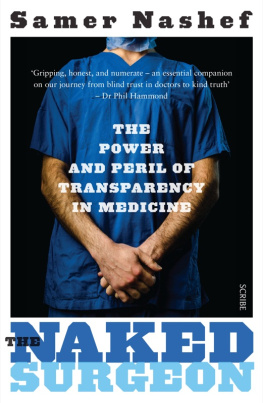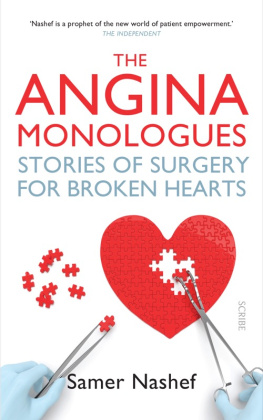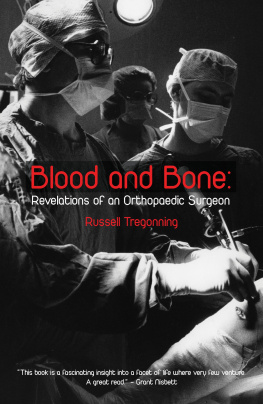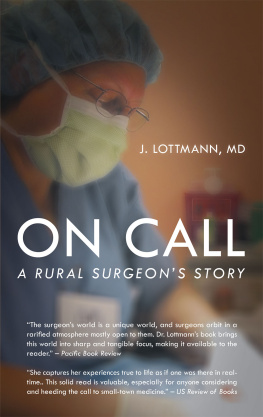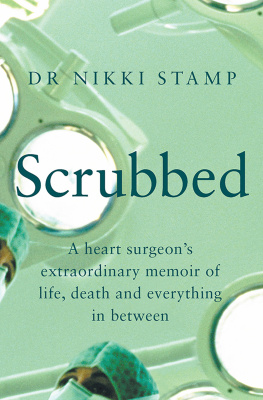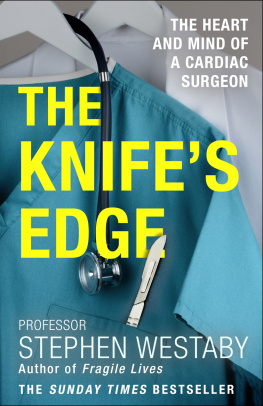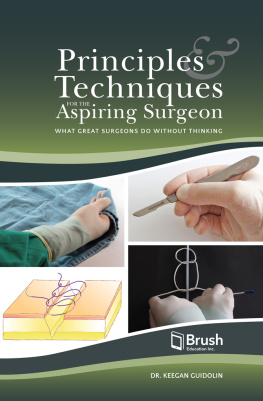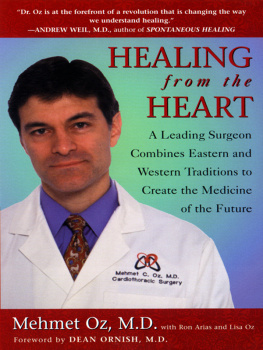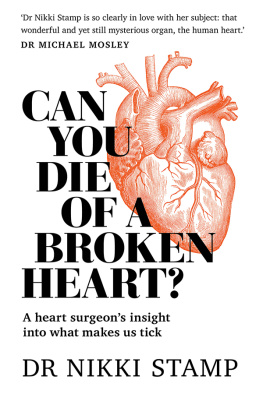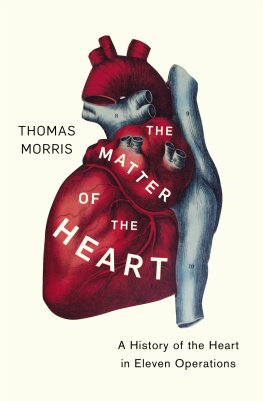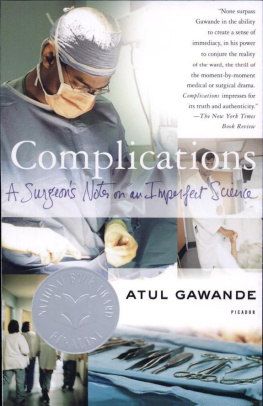
THE NAKED SURGEON
SAMER NASHEF , who qualified as a doctor at the University of Bristol in 1980, is a consultant cardiac surgeon at Papworth Hospital, Cambridge, and a world-leading expert on risk and quality in surgical care. He is the creator of EuroSCORE, which calculates the predicted risk of death from heart operations and is the most successful risk model in medicine; it is used worldwide and is credited with saving tens of thousands of lives. The author of more than 200 publications, Nashefs research has been widely cited, and he has been invited to lecture in more than 30 countries. He is a clinical tutor at the University of Cambridge, and is also a dedicated teacher and public communicator, having appeared in NHS Direct videos, at the Wellcome Trust foundation, and in Channel 4s The Operation . Outside the world of medicine, he is a regular compiler of cryptic crosswords for The Guardian and the Financial Times under a pseudonym.
To my mother
and
Neil Armstrong
(and to all the other patients who died after heart surgery)
Scribe Publications
1820 Edward St, Brunswick, Victoria, Australia 3056
2 John St, Clerkenwell, London, WC1N 2ES, United Kingdom
First published by Scribe 2015
Copyright Samer Nashef 2015
Foreword Terence English 2015
Storm Tim Minchin 2008. Quote used with kind permission.
All rights reserved. Without limiting the rights under copyright reserved above, no part of this publication may be reproduced, stored in or introduced into a retrieval system, or transmitted, in any form or by any means (electronic, mechanical, photocopying, recording or otherwise) without the prior written permission of the publishers of this book.
The moral right of the author has been asserted.
National Library of Australia
Cataloguing-in-Publication data
Nashef, Samer, author.
The Naked Surgeon: the power and peril of transparency in medicine / Samer Nashef.
9781925106664 (Australian edition)
9781922247933 (UK edition)
9781925113808 (e-book)
1. HeartSurgery. 2. SurgeryDecision making. 3. SurgeryRisk factors. 4. Diagnosis, Surgical. 5. Surgical indications. 6. Evidence-based medicine.
617.9
A CIP record for this book is available from the British Library
scribepublications.com.au
scribepublications.co.uk
Contents
by Sir Terence English
: Still Nobody Told the Parents
: A True Haunting
Primum non nocere
(first, do no harm)
There are three kinds of doctor:
those who can count
and those who cant.
Foreword
I had the pleasure of being a colleague of Samer Nashef after his appointment as a consultant at Papworth Hospital in 1992. It soon became apparent that we had added an unusually gifted and stimulating surgeon to our team. He already had a wide experience across the field of adult cardiac surgery, and was a fine technical surgeon and wise clinician. He also had the habit of questioning received wisdom, which encouraged us to look critically at procedures and see how these could be improved.
In due course, the latter propensity became a driving ambition to help cardiac surgeons to become more transparent about their results. This in turn led to creating the EuroSCORE model for predicting the outcome of heart operations, so that individual and national groups of surgeons could compare their results. The model became widely applied across Europe and beyond, and acted as an important stimulus for improving the results of cardiac surgery, thereby saving many lives.
Nashefs book gives interesting examples of his investigations into factors affecting outcomes, such as whether surgeons should operate immediately after a death on the table, and whether the risk-propensity of individual surgeons is measurable and can affect their results. He has a gift for making complex issues understandable, and presents the means by which patients can use mortality data to help them come to informed decisions about the risks and benefits of treatments offered them. At a more general level, he provides powerful arguments against some of the ill-conceived targets and rankings created by non-professionals that hospitals have been subjected to, and shows how these can mislead patients and demoralise doctors.
The Naked Surgeon is altogether a very stimulating read and one that will be of great interest to both patients and doctors. It should also receive the attention it deserves from health politicians, hospital managers, and health economists.
Sir Terence English, KBE, FRCS, FRCP
Past President of the Royal College of Surgeons of England
Prologue
As a medical student in 1977, I had a profound dislike of surgeons. They tended, I thought, to combine arrogance with a stunning ignorance of most aspects of medicine to which they could not take a knife. Many of my fellow students felt the same. While this was initially due to youthful prejudice on my part, over the course of my training I stumbled upon some disturbing facts about the practice of surgery that revealed my bias to have been based in truth.
In British medical schools in the 70s, students were attached to firms for varying periods, usually of a few weeks. Firms were hospital sub-units made of a pair or a trio of senior doctors, or consultants, working in one specialty, such as general surgery, or general medicine, or general surgery with an interest in urology, and so forth. We medical students tagged along on the firms ward rounds, sat in clinics, sometimes asked questions, and other times tried to answer them. Occasionally, we were directly taught at the bedside or in a corridor, if the opportunity arose and if the busy and harassed doctor we were trailing felt inclined to teach. In exchange for this medical education by osmosis, we were expected to help the junior doctors with clerking duties (endless paperwork and form-filling), but our most crucial and useful task consisted of taking an impossibly large number of daily blood samples from patients. These were for the tests needed to make a diagnosis and manage the patients progress during their hospital stay. And so we went, from firm to firm, trying to learn, enjoying the hospital environment, and, vampire-like, taking countless blood samples.
My next firm was to be the professorial surgical firm, distinguished by being academic: in other words, some of its senior surgeons, in addition to being consultants, had university positions with titles such as lecturer or professor. These were somewhat more prestigious and grand surgeons who, in addition to operating on patients, were expected to be keen and dedicated teachers and researchers. During a two-month stint, students on this firm did all the usual clerking work and blood samples, but were also given an additional assignment. We were each allocated a topic to read about, and we were required, on the last Friday of our attachment to the firm, to give a short talk on the chosen topic to a small and select assembly consisting of the firm surgeons, professor, and lecturers, as well as our fellow students.
My assigned topic was emergency arterial surgery, which sounded pretty exotic. Not much surgery was done on arteries in those days, so such operations, and emergency ones to boot, promised to be an eye-opener.
I managed to find two examples of such surgery. The first was a femoral embolectomy, the removal of a blood clot from the main artery to the leg. This is what happens: A patient with a problematic heart gets a blood clot in it. As the heart beats, the clot becomes detached (in medical parlance, it becomes an embolus, or roving clot) and travels out of the heart and down the body until it gets stuck in the femoral artery, the large blood vessel that feeds the leg. The leg becomes cold, white, and painful, and, unless the clot is quickly removed by femoral embolectomy, the leg dies and drops off, or has to be amputated. Now that is drastic surgery, but it is quite tame when compared with the second example I found: repair of a ruptured abdominal aortic aneurysm (or triple A).
Next page
